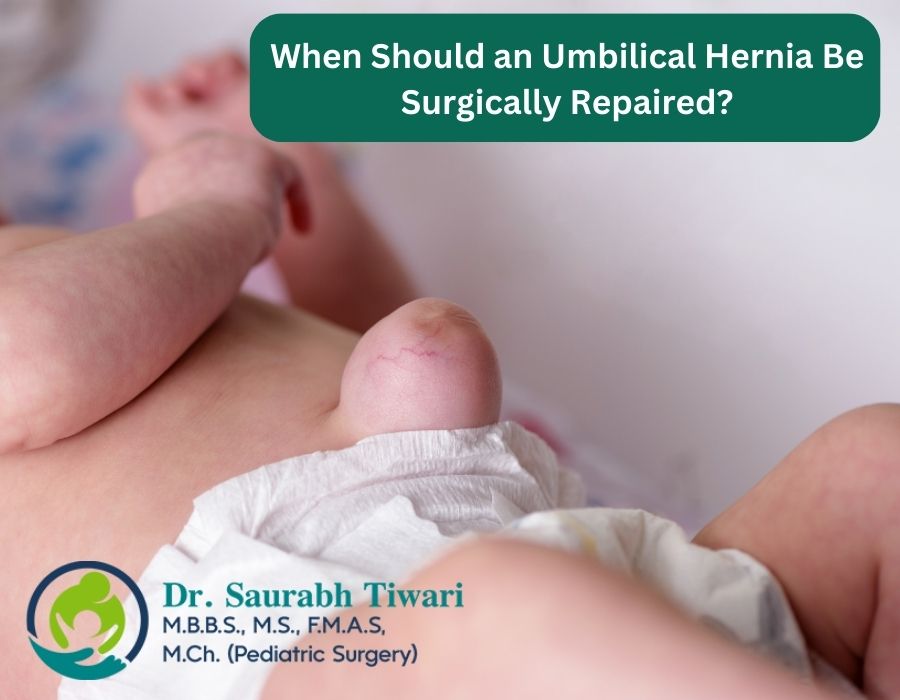Umbilical hernias are a common occurrence in both infants and adults, characterized by a bulge or protrusion near the navel. While they often resolve on their own in infants, adults with umbilical hernias may require surgical intervention. But when exactly should an umbilical hernia be surgically repaired? In this blog, we will delve into the factors that influence this decision and explore the importance of seeking expert advice.
Understanding Umbilical Hernias
First, let’s understand what an umbilical hernia is. It occurs when part of the intestine or fatty tissue pushes through a weak spot in the abdominal wall, typically near the navel. In infants, these hernias are quite common and often self-resolve within the first few years of life as the abdominal muscles strengthen. However, in adults, umbilical hernias are usually the result of strain on the abdominal wall, such as from obesity, pregnancy, heavy lifting, or previous surgeries. Unlike in infants, adult umbilical hernias rarely heal on their own.
Factors Influencing Surgical Repair
Several factors play a crucial role in determining whether an umbilical hernia should be surgically repaired:
Size of the Hernia
Smaller hernias may not require immediate surgery and can be monitored. However, larger hernias are more likely to cause discomfort and complications, making surgical repair a more urgent option.
Symptoms
If the hernia causes pain, discomfort, or difficulty with daily activities, it’s a clear indication of surgical intervention. Symptoms can range from a dull ache to sharp, severe pain.
Risk of Incarceration
When a portion of the intestine becomes trapped within the hernia, it can lead to incarceration, a serious medical emergency. If there’s a risk of this happening, surgery is typically recommended.
Cosmetic Concerns
Some adults opt for surgical repair due to cosmetic concerns. A protruding hernia can affect self-esteem and body image, prompting individuals to seek surgery for aesthetic reasons.
Medical History
An individual’s medical history plays a crucial role. Those with a history of multiple hernias or complications from hernias in the past may be advised to undergo surgical repair earlier to prevent further issues.
General Health
The patient’s overall health and ability to undergo surgery are essential factors. Patients with significant underlying medical conditions may need to address those issues before undergoing hernia repair.
The Importance of Expert Advice
Ultimately, the decision to undergo surgical repair for an umbilical hernia should be made in consultation with a medical professional. A surgeon, like Dr. Saurabh Tiwari, who specializes in pediatric, neonatal, and laparoscopic surgeries, can provide valuable guidance. They will assess the specific case, taking into account all the factors mentioned above, and recommend the most appropriate course of action.
Dr. Saurabh Tiwari, with expertise in pediatric and neonatal surgeries, understands the unique considerations when dealing with umbilical hernias in children. In pediatric cases, the decision to surgically repair an umbilical hernia is often based on factors like the child’s age, the size of the hernia, and the potential for complications. Dr. Tiwari’s experience and knowledge in this field make him a trusted authority in guiding parents through this decision-making process.
Conclusion
In conclusion, the decision to surgically repair an umbilical hernia hinges on several factors, including size, symptoms, risk of incarceration, cosmetic concerns, medical history, and overall health. Seeking expert advice from a surgeon like Dr. Saurabh Tiwari, who specializes in pediatric, neonatal, and laparoscopic surgeries, is crucial in making an informed choice. With the right guidance, individuals can achieve the best possible outcome and ensure their health and well-being.




